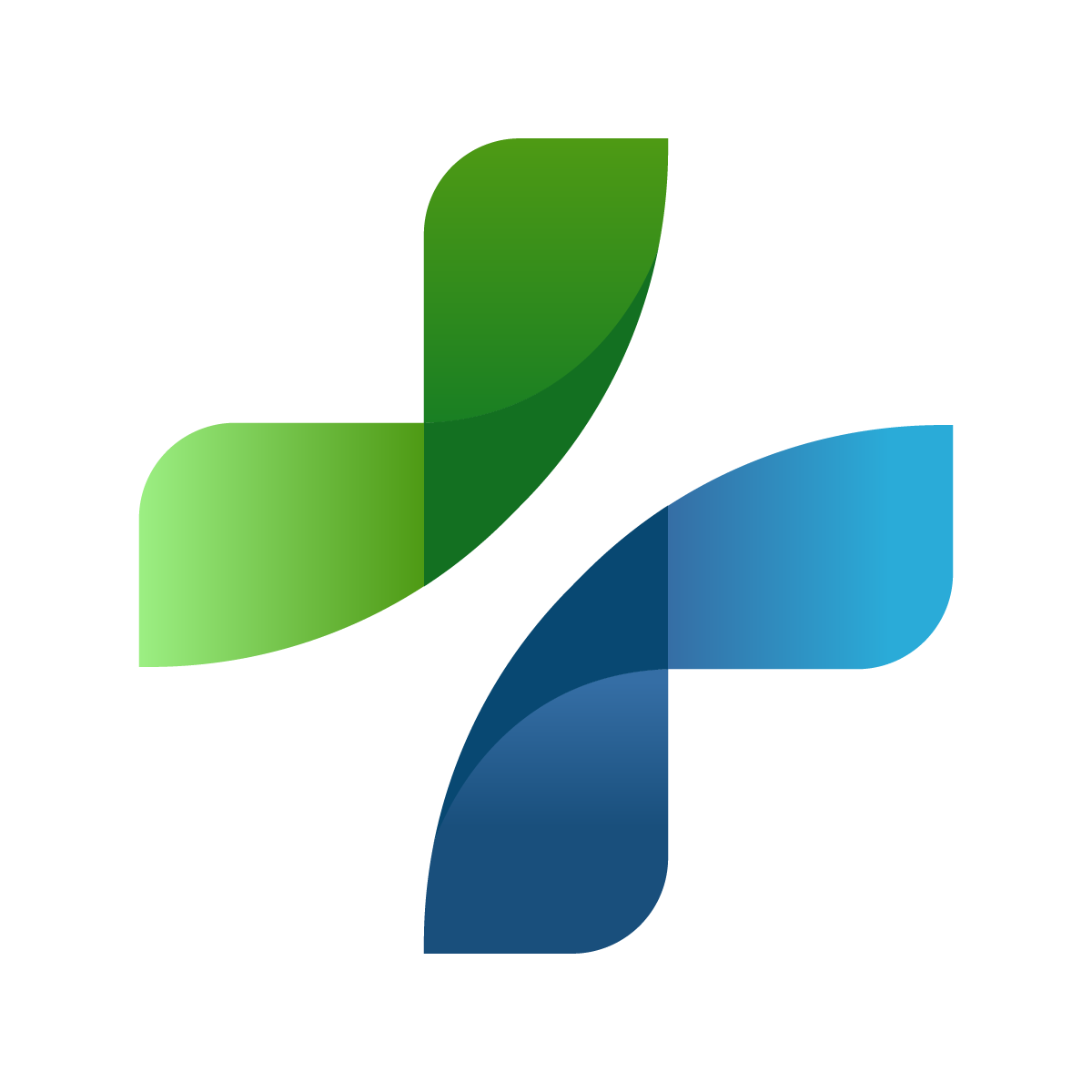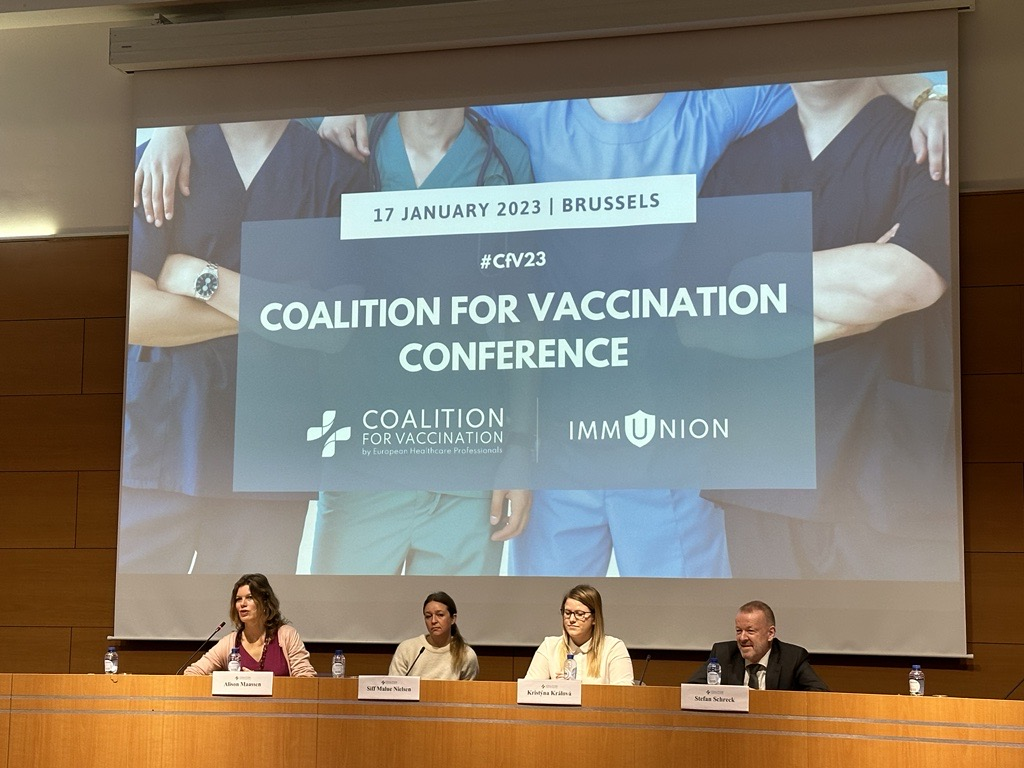On 17 January 2023, the Coalition for Vaccination co-chairs (the Standing Committee of European Doctors (CPME), the Pharmaceutical Group of the European Union (PGEU), and the European Federation of Nurses Association (EFN) organised its first Coalition for Vaccination Conference. Around 100 healthcare professionals and policy-makers gathered at the International Auditorium in Brussels to reflect on past years’ achievements and plan for the future.
What is the current status of vaccination policy in Europe? What are the challenges of improving vaccine uptake? How do EU-funded projects such as IMMUNION contribute to raising awareness of the benefits of vaccination? What are the main lessons that we are taking with us from 3 years of activity? And who are the key actors in achieving the goal of a healthier Europe? These topics – and more! – were covered during the discussion-packed event.
The Conference kicked off with a welcome speech by Dr. Jacques de Haller of the Standing Committee of European Doctors (CPME) who shared some key facts about the Coalition for Vaccination with the audience. Dr. de Haller pointed out that cooperation is crucial when it comes to improving vaccine uptake – a conclusion that would come up again several times throughout the event. With 18 European associations and 10 associated organisation in its ranks after it was convened in 2019, the Coalition for Vaccination proved that effective collaboration lays at the core of successful vaccine communication. Through various advocacy campaigns (all of which can be found here) and its close collaboration with the IMMUNION project, the Coalition for Vaccination provided the general public, as well as healthcare professionals, with accurate information about vaccines and tools to enhance their vaccine communication strategy, respectively.
The need for strengthened collaboration to boost immunisation efforts was once again emphasised by Stefan Schreck, adviser to the European Commission’s DG SANTE, during the first panel discussion, moderated by EuroHealthNet’s Alison Maasen.
“We need to come together to close vaccination gaps.” (Stefan Schreck, DG SANTE)
Stefan Schreck stressed that, while the COVID-19 pandemic has brought vaccination back into the spotlight, our work is not done yet, and vaccination against the COVID-19 virus alone is not enough to ensure the health of the population. On the contrary, he argued, the population must be protected at all stages of life. Lastly, he urged healthcare professionals to join the EC’s efforts and continue to participate in the efforts to improve vaccine confidence and uptake.
After Kristýna Králová of the Permanent Representation of the Czech Republic to the EU assured the audience that tackling vaccine hesitancy and providing the tools for strengthened collaboration were key priorities during the Czech Presidency of the Council of the EU, Siff Malue Nielsen of WHO/Europe pointed out that vaccine communication needs to be tailored to the needs of each target group to be successful.
“We really need to tailor interventions and acknowledge that population groups are different.” (Siff Malue Nielsen, WHO/Europe)
At the same time, she stressed that ownership is key: experts and policymakers from the health sector have to take responsibility when certain strategies aren’t as successful as envisioned and come up with local solutions to local challenges.
During the panel discussion, another conclusion came up: that simply putting things on a piece of paper does not solve the problem of vaccine hesitancy; the focus needs to be put on the actual implementation. Answering a question from the audience, Siff Nielsen suggested a higher focus on education to increase vaccine trust, with vaccination classes being integrated in the school curricula, while Kristýna Králová suggested that communication and behavioural experts should also be included in immunisation efforts.
The second session of the event debuted with Alba Godfrey of EuroHealthNet, Project Coordinator of IMMUNION, providing an overview of the project and reflecting on its outcomes. From the training sessions that were designed to support trainers of vaccine communication in their efforts, to the communication campaigns that were developed in the project and the toolbox that was created to help provide validated resources on vaccination, IMMUNION project partners have been very active in supporting the Coalition for Vaccination’s mission and paved the way for future achievements.
"Collaboration has always been at the heart of IMMUNION." (Alba Godfrey, EuroHealthNet, IMMUNION Project Coordinator)
After Greet Hendrickx of the University of Antwerp (a project partner in IMMUNION) has shared some key facts and data on vaccine hesitancy as a result of the work developed by the Vaccine Confidence Project, the discussion moved on to the second panel discussion. Paola de Castro (Istituto Superiore Di Sanita'), Francisco Ribeiro Mourão (European Junior Doctors), Juan José Fernández Romero (European Patients' Forum), Christiaan Keijzer (European Federation of Salaried Doctors), and Koen Straetmans (APB-Belgian Pharmaceutical Association), were part of the panel.
Francisco Ribeiro Mourão reinforced the need to tailor the vaccination strategy to the target group, while arguing that healthcare professionals must reclaim their power as the most trusted source of accurate information on vaccines.
"We can have many sources of information, but in the end I trust my nurse, my doctor, my paediatrician, my pharmacist." (Francisco Ribeiro Mourão, European Junior Doctors)
We need to this because, as Christiaan Keijzer pointed out, while there will always be a small group who is against immunisation, the vast majority wants to have accurate, evidence-based information at their disposal to make informed decisions.
During the third panel discussion, involving Aurélie De Waele (University of Antwerp), Stefano del Torso (European Academy of Paediatrics), Katie Owens (DG SANTE), Catarina Silva (European Healthcare Students' Associations Summit), and Alain Delgutte (PGEU), building on what has been concluded in the previous sessions, the topic of healthcare professionals as the most trusted sources of information was reinforced.
Aurélie De Waele of the University of Antwerp mentioned during her keynote speech that healthcare professionals tend to underestimate their influence in vaccine communication, often feeling helpless when dealing with misinformation among patients and social media. Stefano del Torso of the European Academy of Paediatrics stated that paediatricians spend an hour per day on average on vaccine safety consultation, which proves that patients trust them when making important decisions related to their children's health - and that healthcare professionals must be supported with further training on vaccine communication, where needed.
At the same time, taking into account cultural differences when addressing various communities on the topic of immunisation is crucial - as well as finding new ways to get the message across to the intended audience (for example, presenting hard numbers and data may convince scientists, but not have the same effect on other groups). Also, there are many resources on vaccination that have been already developed, like the ones produced within IMMUNION, that can be incorporated into vaccine communication plans and strategies.
"We don’t need to reinvent the wheel, because there is so many great material out there, and one good example is IMMUNION." (Katie Owens, DG SANTE)
However, (better) communication alone won't lead to better vaccine uptake - we need to have a more holistic approach to immunisation, as Katie Owens of the European Commission's DG SANTE pointed out. How do we achieve this? One part of the solution was revealed during the fourth and final panel discussion of the day, moderated by Elizabeth Adams, president of the European Federation of Nurses Associations (EFN). The discussions aimed to take a look at the future generations of healthcare professionals, as the Coalition's student organisations presented their perspectives.
Benedicte Molnes, from the European Nursing Students Association (ENSA), Luka Delak, on behalf of the European Medical Students' Association (EMSA), Gabriel Branco, from the European Pharmaceutical Students' Associations (EPSA), and Ieva Tamošiūnaitė, representing the European Dental Students' Association (EDSA) each presented the recent and ongoing activities of their associations.
The key takeaway of the discussion was that healthcare students want to be included in vaccine communication strategies - yet they often feel overlooked. Ieva Tamošiūnaitė suggested that students be more involved in the vaccination process, even able to administer vaccines, as it happens already in some countries. Luka Delak stressed that education could be reformed to cultivate respect towards science and foster critical thinking, which would in turn contribute to better public health.
"The future is really strong for healthcare professionals to come work together." (Elizabeth Adams, European Federation of Nurses Associations)
The event ended with the final remarks from Stefan Schreck and Elizabeth Adams, who emphasised the power of collaborative work and partnerships to make a sustainable difference to lifelong vaccination for everyone. The importance of involving all citizens, as demonstrated by the Conference on the Future of Europe, and of incorporating a broad diversity of expertise and stakeholders should not be underestimated, as these are essential to the continuous improvement of vaccination initiatives. Another point that was reinforced was that students and their respective associations are crucial in the vaccination debate as they represent the current and future healthcare professionals.
While the Conference has only lasted one day, many valuable points were raised that would guide the efforts of healthcare professionals in the next few years, from all healthcare professionals joining forces to boost immunisation, to adapting vaccine communication strategies to the target groups and making use of available tools to better communicate with patients. The support and guidance from the European Commission and DG SANTE colleagues have been invaluable to the work of the Coalition for Vaccination.
The Coalition for Vaccination will continue work on this mission and help increase vaccine uptake and trust around Europe. You can follow the Coalition's work on Twitter, LinkedIn, and Facebook.

